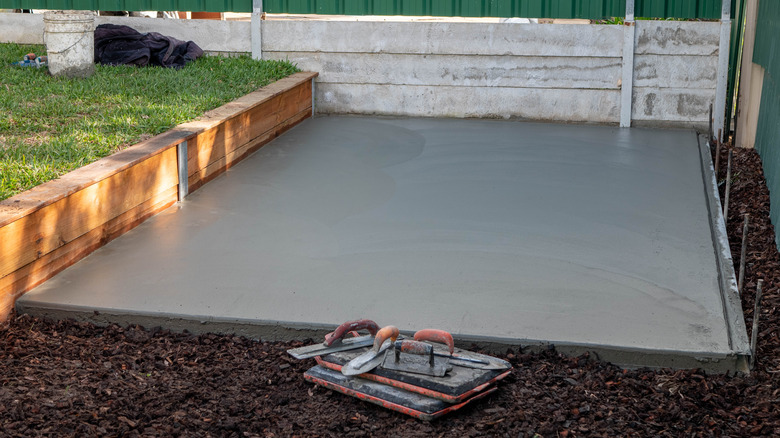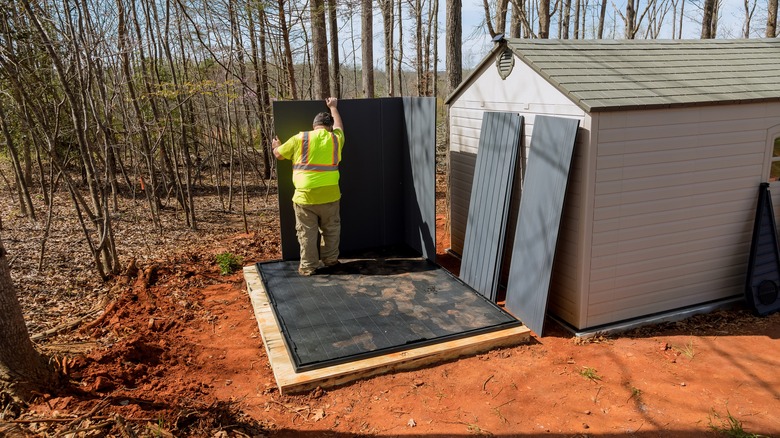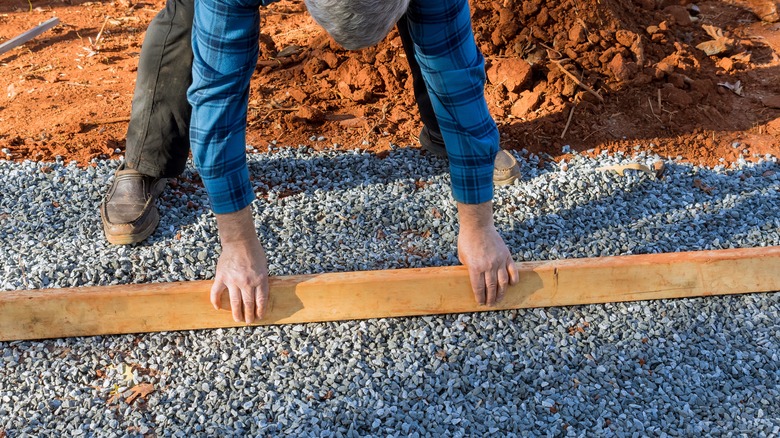Do You Really Need A Foundation For Your Storage Shed?
Have you bought a DIY shed kit but are wondering if you need to lay a foundation first? If your structure is light and you're looking for an easy, no-fuss weekend DIY, you might be tempted to skip this step. The ground seems sturdy enough, so you don't anticipate the shed shifting or sinking. But is that a good idea, or do you always need to add a foundation, no matter the circumstances? The answer can be multifaceted depending on your situation, so we tapped our construction expert, Matthew DiBara, a fourth-generation contractor and co-founder of The Contractor Consultants, for his take. According to DiBara, you definitely need one for large, heavy sheds, but you can get away with a no-foundation setup for smaller sheds. But you might still want to still consider one for the latter.
"While not all outside sheds need to be built on a foundation, most can benefit from one. Small sheds or those made from less sturdy materials like plastic or metal can often be placed directly on level ground or a simple base. However, even for these small sheds, installing a gravel base has benefits," he exclusively tells House Digest. To help you assess if the extra labor and cost are worth adding a foundation, we took a deeper dive into those benefits below.
When do you need a foundation
Before we tackle all the different types of foundations and whether they're safe to DIY or not, let's first take a look at when you would need a foundation. Since these are some of the hidden costs that can sneak up on you when DIYing a storage shed, it's imperative to know. "For larger sheds (bigger than 8 by 8), a foundation is necessary to support both the shed and its contents. If you're storing heavy equipment, a well-anchored foundation is crucial to prevent collapse or sinking," Matthew DiBara tells House Digest in an exclusive interview. However, just because your shed is small and light doesn't mean you don't need one. There are other factors to keep in mind to ensure your shed will be as long-lasting as possible. "On uneven ground, a foundation provides stability that a simple placement wouldn't offer. In moisture-prone areas, a properly constructed foundation ensures good air circulation and prevents water damage," our expert explains.
But before you lay your foundation, DiBara recommends taking the time to select the best spot for it. If the ground is dry, level, and without vegetation, you will have an easier time laying and maintaining it. "Pick a spot that doesn't have standing water and avoid interference from trees or other structures," he explains. "Proper planning and measuring are crucial — your shed's foundation should be slightly wider than the shed itself to prevent water accumulation." Taking these into consideration will make your project much more successful.
The different kinds of foundations to choose
If your project needs a foundation, then it's time to choose what kind is most appropriate. This will hinge on the weight and use of your shed. "A gravel foundation is ideal for small to medium-sized sheds because it offers good drainage and is easy to lay down," Matthew DiBara explains exclusively to House Digest. However, if you have a small shed and are mostly worried about air circulation, he says you can get away with a treated wood foundation: "[It's] made of pressure-treated lumber, is relatively easy for anyone with basic carpentry skills to construct." For medium to large-sized sheds, he recommends a concrete slab: "[It] provides a very sturdy flooring option that can handle heavy loads, especially useful for sheds without a built-in floor." But, if your structure is on a slope, go with concrete piers instead since they offer "stability and resistance to freezing conditions."
If you were hoping to save some money and DIY the project yourself, DiBara thinks it might be safe to do so for the less-involved foundations. "Simple foundations like gravel or treated lumber can be manageable for DIY enthusiasts, but more complex structures such as concrete slabs or piers should be handled by professionals to meet local standards and regulations," he stresses. This will ensure you don't make any errors that will cost you more in the end.


